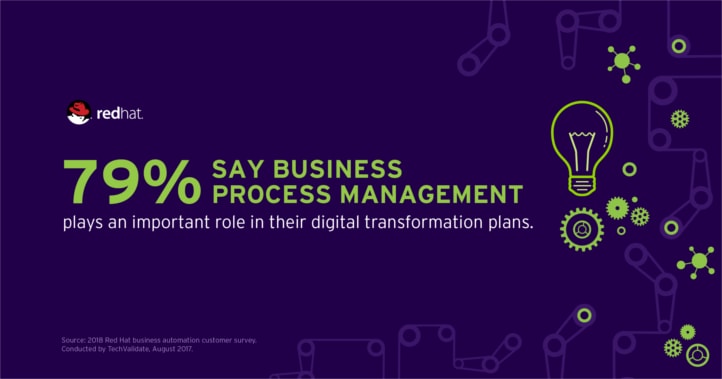Over the past decade we have witnessed a dramatic shift in the way organizations are conducting business, and the pivots they are making in order to become more agile and efficient. This has been matched by a marked shift in IT as technology increasingly plays a central role in driving these changes through the process of digital transformation.

Automation is one of the key capabilities supporting this transformation. From a business standpoint, eliminating the need for manual (i.e., human) intervention in complex or repetitive business processes can have a positive impact on operations. By automating certain decisions, organizations can not only accelerate process workflows but also improve the accuracy and consistency of the results.
The concept of business automation is not new, but the technologies continue to evolve to meet changing business demands. Ultimately, the value of these technologies can manifest itself as an increase in agility, e.g., operational efficiency, time-to-market, or market and customer demand; a more responsive and personalized customer experience; and lower costs.
In August 2017, we polled a selection of Red Hat customers to learn more about their motivations for adopting business automation technologies and how they are using them, as well as the role these technologies play in respondents' digital transformation initiatives.
Based on the results of this survey, respondents appear to have a firm grasp of the benefits offered by business automation, although they identified a broad range of priorities driving their adoption of this technology. When asked about their primary motivation, 34 percent indicated that their organization has adopted business process management (BPM) technology—one of the core capabilities of business automation—to improve operational efficiency. Another 24 percent identified the need to improve customer experience, and 15 percent said they are seeking to lower the cost of operational processes.
To accomplish these goals, respondents are applying this technology within their organization as a means of automating internal processes (57 percent); supporting new applications (46 percent); automating external processes, e.g., processes that touch customers, partners or suppliers, (41 percent); and supporting self-service applications (29 percent).
While BPM is one of the core capabilities of business automation, it is often deployed alongside other technologies that either enable or extend it, such as integration (deployed by 57 percent of respondents) or containers (55 percent), or have been designed to provide a more specific automation function. Technologies in this second group that are being deployed by respondents include mature capabilities such as business rules engines (61 percent), mobile application platforms (29 percent) and case management (27 percent), as well as more nascent capabilities such as low-code application development (24 percent), artificial intelligence and machine learning (20 percent), and robotic process automation (10 percent).
Together, these technologies are being used to support the automation efforts driving digital transformation for the majority of respondents, with 79 percent emphasizing that BPM plays an important role in their digital transformation plans.
Header image: "Gears" by Joe deSousa on Flickr
Über den Autor
Red Hat is the world’s leading provider of enterprise open source software solutions, using a community-powered approach to deliver reliable and high-performing Linux, hybrid cloud, container, and Kubernetes technologies.
Red Hat helps customers integrate new and existing IT applications, develop cloud-native applications, standardize on our industry-leading operating system, and automate, secure, and manage complex environments. Award-winning support, training, and consulting services make Red Hat a trusted adviser to the Fortune 500. As a strategic partner to cloud providers, system integrators, application vendors, customers, and open source communities, Red Hat can help organizations prepare for the digital future.
Mehr davon
Nach Thema durchsuchen
Automatisierung
Das Neueste zum Thema IT-Automatisierung für Technologien, Teams und Umgebungen
Künstliche Intelligenz
Erfahren Sie das Neueste von den Plattformen, die es Kunden ermöglichen, KI-Workloads beliebig auszuführen
Open Hybrid Cloud
Erfahren Sie, wie wir eine flexiblere Zukunft mit Hybrid Clouds schaffen.
Sicherheit
Erfahren Sie, wie wir Risiken in verschiedenen Umgebungen und Technologien reduzieren
Edge Computing
Erfahren Sie das Neueste von den Plattformen, die die Operations am Edge vereinfachen
Infrastruktur
Erfahren Sie das Neueste von der weltweit führenden Linux-Plattform für Unternehmen
Anwendungen
Entdecken Sie unsere Lösungen für komplexe Anwendungsherausforderungen
Original Shows
Interessantes von den Experten, die die Technologien in Unternehmen mitgestalten
Produkte
- Red Hat Enterprise Linux
- Red Hat OpenShift
- Red Hat Ansible Automation Platform
- Cloud-Services
- Alle Produkte anzeigen
Tools
- Training & Zertifizierung
- Eigenes Konto
- Für Entwickler
- Kundensupport
- Mehrwert von Red Hat berechnen
- Red Hat Ecosystem Catalog
- Partner finden
Testen, kaufen und verkaufen
Kommunizieren
Über Red Hat
Als weltweit größter Anbieter von Open-Source-Software-Lösungen für Unternehmen stellen wir Linux-, Cloud-, Container- und Kubernetes-Technologien bereit. Wir bieten robuste Lösungen, die es Unternehmen erleichtern, plattform- und umgebungsübergreifend zu arbeiten – vom Rechenzentrum bis zum Netzwerkrand.
Wählen Sie eine Sprache
Red Hat legal and privacy links
- Über Red Hat
- Jobs bei Red Hat
- Veranstaltungen
- Standorte
- Red Hat kontaktieren
- Red Hat Blog
- Diversität, Gleichberechtigung und Inklusion
- Cool Stuff Store
- Red Hat Summit

